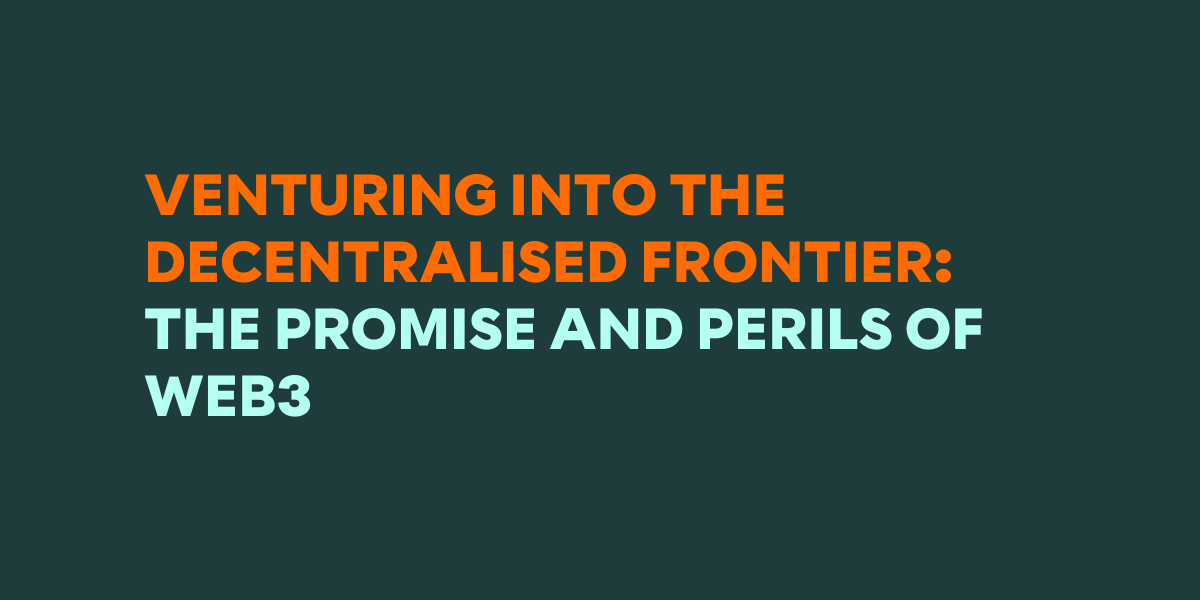VENTURING INTO THE DECENTRALISED FRONTIER: THE PROMISE AND PERILS OF WEB3
16 October 2024

In the year 2024, humanity finds itself teetering on the edge of a new digital precipice known as Web3. Unlike its predecessors, this latest iteration of the World Wide Web promises to decentralise the internet, wresting control from the iron grip of tech giants and putting it back into the hands of ordinary users. At least, that’s what the evangelists claim. Whether you believe them depends largely on whether you think humanity is capable of learning from its mistakes.
Web3 is built on the foundation of blockchain technology, a kind of digital ledger that is tamper-proof and transparent. The idea is that by decentralising data storage and processing, Web3 can eliminate the need for middlemen like Facebook, Google, and Amazon, and thereby democratise the internet. In this brave new world, users can own their data, control their digital identities, and even earn cryptocurrency for their online activities.
Of course, this utopian vision of Web3 has its sceptics. For every wide-eyed enthusiast hailing Web3 as the dawn of a new digital age, there's a jaded realist pointing out its darker side. “Sure, you can have a decentralised internet,” they say, “but it’s not all rainbows and unicorns. This brave new world is a tangled web of complexity that can turn into a haven for criminal mischief. Without centralised oversight, you’ve got a system where shady dealings and illicit transactions can flourish under the radar. The promise of transparency seems to get lost in the bureaucratic maze of cryptographic protocols and obscure governance models. So while Web3 might look like a shiny new toy, it’s also a Pandora’s box of legal headaches and ethical dilemmas.”
The Web3 ecosystem is populated by a colourful cast of characters. There are the developers, tirelessly coding away in the hopes of creating the next killer dApp (decentralised application). There are the investors, pouring billions of dollars into blockchain startups in a frenzy of speculative mania. And then there are the ordinary users, trying to make sense of terms like “smart contracts,” “NFTs,” and “DeFi,” and wondering if they’ve somehow wandered into a parallel universe where English no longer makes any sense.
At the heart of Web3 is the concept of decentralisation. Instead of relying on centralised servers and databases, Web3 applications run on a network of nodes, each one storing a copy of the blockchain. This makes the system more resilient to censorship and hacking, but it also introduces a host of new challenges. For one thing, decentralisation means that there is no central authority to resolve disputes or enforce rules. If you lose your private key, the digital equivalent of a password, you can kiss your crypto assets goodbye. And if someone manages to hack your wallet, there is no customer support hotline to call for help.
Despite these challenges, the Web3 movement continues to gain momentum. Artists and musicians flock to the platform, lured by the promise of NFTs (non-fungible tokens) that allow them to sell digital art and music directly to fans, without having to go through traditional gatekeepers like record labels or galleries. Activists see Web3 as a tool for social justice, enabling grassroots movements to organise and fundraise without fear of government interference. And then there are the dreamers, who see in Web3 the seeds of a new kind of
society, one where power is distributed more equitably and everyone has a voice.
In the end, whether Web3 will live up to its lofty promises or collapse under the weight of its own contradictions is anyone’s guess. But one thing is certain: the internet is evolving, and humanity is once again venturing into uncharted territory. Whether this new frontier will lead to a digital utopia or a dystopian nightmare remains to be seen, but for now, the pioneers of Web3 press on, driven by the hope that maybe, just maybe, this time they’ll get it right.
ABOUT SAM DORRER:
Sam Dorrer is an Island-based entrepreneur focused on innovation and technology, having founded and led two companies that create value across multiple spheres and sectors. His current venture, Echo, empowers investors to collateralise capital on a DeFi lending protocol by tokenising traditional investments on the blockchain, enabling a seamless integration of crypto and fiat spaces for long-term wealth building.
Sam is also the founder and managing director of Flux Technology, a B2B engineering and software development company that develops cost-effective and innovative digital and intellectual property assets. With a strong background in research & development, business strategy, marketing, legal, and logistics, Sam excels at navigating complex challenges and delivering practical solutions.
This article has been created by a third party and is provided for general informational purposes only and does not constitute endorsement, recommendation, or approval by Digital Isle of Man.
While we strive to ensure the accuracy, relevance, and reliability of third-party content, we do not warrant or guarantee its completeness, timeliness, or fitness for any particular purpose. Any reliance you place on such content is strictly at your own risk.





